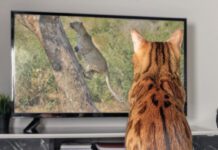Indoor cat? Outdoor cat? Should your kitty go out of the house without supervision? A few decades ago no one would have questioned that idea because the assumption was that cats are hunters that need the outdoors to thrive. Not anymore.
Its a lot safer for them to live indoors and a lot less stressful, too, says Ilona Rodan, DVM, a private practitioner in Madison, Wisconsin. As long as a cat is kept inside from an early age, says Rodan, almost any can live a full and contented life. Even strays that lived outside can comfortably adjust to life fully indoors, as have all six of Rodans cats, none of which will even approach an open door.
Outside perils
Most veterinarians agree there are dangers to life outside that do not compensate for the added stimuli available there. While most of us know of a cat that was struck and killed on a street, there are other dangers, too. Some cats are killed when they find a puddle of antifreeze, which tastes sweet but is highly toxic, or when they encounter lawn pesticides, rodent poisons, coyotes, other cats, or dogs. A cat that kills and eats a pest rodent that has ingested poisonous bait can also be poisoned. And then there are those cats that fall from tree limbs, get hurt when fighting with another cat, are chased by a dog, or find themselves locked in a place, such as a garage, that was open long enough for the cat to get inside.
There are diseases contracted more frequently outdoors, including parasites such as fleas, ticks, and some intestinal parasites; infectious agents such as feline leukemia virus, feline immunodeficiency virus, and rabies. Health care costs for outdoor cats, to prevent the common problems of being outside, are much greater than for indoor cats. Even with the best prevention, additional costs can soar if theres injury or poisoning. Altogether, though, the most striking result is in lifespan. Indoor cats, says Rodan, frequently live twice as long as do outdoor ones.
Outside in a supervised way
But dont cats live richer and more natural lives with regular, roaming access to the outdoors? Jessica Contis one-year-old, Grace, reportedly exhibited a very strong interest in the outside as a young kitten. In just a few weeks of unsupervised outside access, though, Grace had several frightening experiences, including getting trapped in a neighboring basement for three days.
Conti, a Cornell University law student, trained Grace to spend time outside in a supervised way: Only while wearing a harness attached to either a leash or a lead while being watched. When she has the time, Conti takes Grace for a walk. More often, she attaches Graces harness to a 30-foot lead attached to a ground stake.
Conti then studies by a window from which she can watch Grace leap at bugs, chase leaves and birds, play in snow and puddles, and snooze in the sun. Conti trained Grace to accept her harness through immediate treat rewards and by providing positive reinforcement by promptly taking her outside every time the harness was put on. Within two weeks of beginning this training regimen, Grace was purring at the sight of her harness and rolling on it affectionately before it was put on.
Bring the outdoors in
Rodan says that Contis solution is a possible middle ground between free outdoor access and an indoor life. She cautions that supervision needs to remain constant and vigilant. She has known cats harnessed outdoors that have been attacked by predators and were unable to escape. As alternatives, she suggests time in a screened-in porch or a meshed outdoor enclosure as more dependably safe ways to spend time outside. (See CatWatch, March 2001)
Rodan doesnt buy the argument that life outdoors is more natural, healthier, and stimulating. In addition to the evidence for longevity, Rodan says that because cats have been domesticated over time, they can readily learn to get all the exercise and stimulation they need without stepping outside.
Interactive toys are effective. Strategically hidden dried food treats can provide a hunt, especially if kitty will be left alone. Most cats love to watch birds at feeders placed outside a favorite window, and they naturally enjoy watching wind-blown leaves and small wildlife, like squirrels. Simple paper bags and boxes can be stimulating. Providing potted catnip, oat grass, or alfalfa can both stimulate and divert cats from other houseplants. For cats whose people are regularly gone all day, growing up with another cat or another pet with which they can interact is valuable. Weve domesticated housecats so much, summarizes Rodan, we have a responsibility to keep them and care for them indoors.



